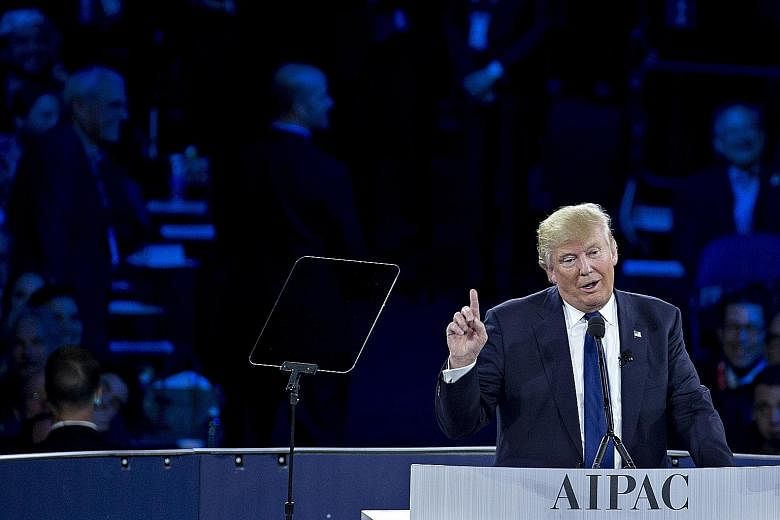NEW YORK • Republican presidential front runner Donald Trump says the best way to halt China's placement of military airfields and anti-aircraft batteries on reclaimed islands in the South China Sea is to threaten its access to US markets.
"We have tremendous economic power over China," he said during a 100-minute interview on foreign policy with The New York Times. "And that's the power of trade."
He did not mention Beijing's capability for economic retaliation.
Like former president Richard Nixon, Mr Trump emphasised the importance of "unpredictability" for a US president, arguing that the country's traditions of democracy and openness had made its actions too easy for adversaries and allies alike to foresee.
"I wouldn't want them to know what my real thinking is," he said of how far he was willing to take the confrontation over the islands in the South China Sea, which are remote and lightly inhabited but extend China's control over a major maritime thoroughfare.
But, he added, "I would use trade, absolutely, as a bargaining chip".
-
Call to allow guns at Republican convention
-
WASHINGTON • More than 22,000 people have signed a petition calling for Americans to be allowed to carry firearms at the Republican National Convention because the ban puts lives at risk.
Guns are not allowed inside the Quicken Loans Arena in Cleveland, where the event - which could descend into a heated battle for the party presidential ticket - is taking place in July. The petition went up on Change.org and by Saturday had been signed by 22,633 supporters in just a few days.
AGENCE FRANCE-PRESSE
In the interview, he also said he would be open to allowing Japan and South Korea to build their own nuclear arsenals rather than depend on the US nuclear umbrella for their protection against North Korea and China.
If the United States "keeps on its path, its current path of weakness, they're going to want to have that anyway, with or without me discussing it", Mr Trump said.
And he said he would be willing to withdraw US forces from both Japan and South Korea if they did not substantially increase their contributions to the costs of housing and feeding those troops. "Not happily, but the answer is yes," he said.
Mr Trump also said he would seek to renegotiate many fundamental treaties with US allies, possibly including a 56-year-old security pact with Japan, which he described as one-sided.
In his worldview, the US has become a diluted power, and the main mechanism by which he would re-establish its central role in the world is economic bargaining. He approached almost every current international conflict through the prism of a negotiation, even when he was imprecise about the strategic goals he sought.
He also said that, if elected, he might halt purchases of oil from Saudi Arabia and other Arab allies unless they commit ground troops to the fight against the Islamic State in Iraq and Syria (ISIS) or "substantially reimburse" the United States for combating the militant group, which threatens their stability.
"If Saudi Arabia was without the cloak of American protection," he said, "I don't think it would be around."
He again faulted the Obama administration's handling of the negotiations with Iran last year - "It would have been so much better if they had walked away a few times," he said - but offered only one new idea about how he would change its content: Ban Iran's trade with North Korea.
He struck similar themes when he discussed the future of Nato, which he called "unfair, economically, to us", and said he was open to an alternative organisation focused on counter-terrorism.
Mr Trump's views fit nowhere into the recent history of the Republican Party: He is not in the internationalist camp of former president George H.W. Bush, nor does he favour Mr George W. Bush's call to make it the United States' mission to spread democracy around the world. He agreed with a suggestion that his ideas might best be summed up as "America First".
"Not isolationist but I am America First," he said. "I like the expression."
He said he was willing to reconsider traditional US alliances if partners were not willing to pay, in cash or troop commitments, for the presence of US forces around the world. "We will not be ripped off any more," he said.
In the past week, the Brussels attacks and an accelerated war against ISIS have moved the focus of the campaign trail conversation back to questions of how the candidates would defend the US and what kind of diplomacy they would pursue.
Mr Trump explained his thoughts in concrete and easily digestible terms, but they appeared to reflect little consideration for potential consequences. In much the same way that he treats political rivals and interviewers, he personalised how he would engage foreign nations, suggesting his approach would depend partly on "how friendly they've been towards us", not just on national interests or alliances.
He disclosed the names of three advisers in addition to five he announced earlier in the week: retired major-general Gary Harrell, major-general Bert Mizusawa and retired rear admiral Charles Kubic. They reflected a continuing bias towards former military officers, rather than diplomats or academics with foreign policy experience.
NEW YORK TIMES

